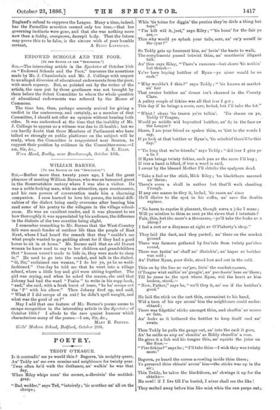WILLIAM BARNES.
[To THE EDITOR OF THE " SFECTATOR."1
Sin,—Rather more than twenty years ago, I had the great pleasure of meeting William Barnes, who was an honoured guest in the Somersetshire rectory where I was also a visitor. He was a noble-looking man, with an attractive, open countenance, and his rare powers of conversation made him a charming companion. I soon learned to love his poems, the initial diffi- culties of the dialect being easily overcome after hearing him read some of his poetry to the villagers in the village school- room. He was an excellent reader, and it was pleasant to see how thoroughly it was appreciated by his audience, the difference in the dialects of the two counties being slight.
I remember remarking to Mr. Barnes that the West-Country folk were much fonder of outdoor life than the people of East Kent, where I had heard the remark that they " couldn't see what people wanted to go gadding about for if they had a good house to sit in at home." Mr. Barnes said that an old Dorset woman he knew used to say to her children and grandchildren that " housen weren't made to bide in, they were made to sleep in." He used to go into the market, and talk in the dialect. " 0, Sir," exclaimed one woman, " I do luv ye, ye be so wold- fashioned." One day he told me that he went into a village school, where a little boy and girl were sitting together. The girl was crying, and when be asked the reason, she said that Johnny had had the word " Psalm " to write in his copy-book, "and," she said, with a fresh burst of tears, " he ha' scrope out the ' P' with his elbow." Then Johnny fired up, and said, " What if I did scrope of en out? he didn't spell naught, and what was the good of en ?"
May I add that one feature of Mr. Barnes's poems seems to escape recognition in the interesting article in the Spectator of October 16th ? I allude to the rare quaint humour which characterises many of the poems.—I am, Sir, &c.,


































 Previous page
Previous page